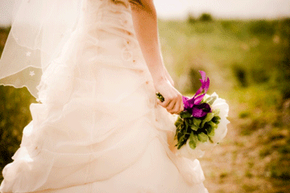 “For spring brides, the floral options for bouquets are nearly endless. See more bridal bouquet pictures.iStockphoto/Thinkstock
“For spring brides, the floral options for bouquets are nearly endless. See more bridal bouquet pictures.iStockphoto/Thinkstock
Although floral bouquets seem to be an eternal wedding tradition, brides didn’t always carry flowers at their weddings. In many ancient cultures, it was common for brides to wear garlands or carry bunches of garlic, herbs and spices. The strong smells were thought to ward off evil spirits. As time progressed, however, fragrant flowers replaced the stiff odors formally favored by ladies about to say "I do." By the time Queen Victoria and Prince Albert were wed in 1840, floral bridal bouquets were on their way to becoming a new tradition and were chosen based on the meaning of each bloom. Today, most brides choose their bouquets based on color, style and taste.
There are more than 270,000 types of flowering plants in the world today, so the options are endless for floral arrangements. Spring is said to be a time of renewal for plant life, making it the season of choice for creating a wedding bouquet. Orchids, peonies, larkspurs, calla lilies, poppies, lilacs, stargazers, tulips, birds of paradise, delphiniums, gardenias and hyacinths are among the most fertile of flowers during the spring months.
For spring weddings, color is king. Vivid bouquets are always popular, and because flowers are so abundant and colorful this time of year, you can create an arrangement that will capture the eye and stand out on your big day. Pastels are also very popular for brides who choose to go with a softer palate. Try dark and light pink roses with pink alstroemeria; you can thrown in some green mums for a beautiful display that will accent any spring wedding perfectly. You could even put together an array of colorful gerber daisies for a vibrant, playful look. Lilies of the valley are expensive blooms, but you can pair them with pale irises, delphiniums and hydrangeas for a beautiful combination of whites and blues.
Some ladies carry an all white bouquet, which is a classic, beautiful choice for any bride. To keep the blooms from blending in with your dress, add lots of texture and don’t be timid about including greenery. Try white roses, peonies, ranunculus and mini-callas with green foliage placed between blossoms. You can also choose white flowers with dark centers, such as anemones.
Continue to the next page to find out what bouquet styles are most popular for spring weddings.
Best Bouquets for Spring Weddings
The style of your bouquet is just as important as the colors and types of flowers you choose. In addition to taking the theme of your wedding into consideration, you also want to think about how elaborate or informal your dress is as well as the personality you want to portray with your overall look. Here are some of the most common options:
- Cascadingbouquet: Flowers are grouped together above the bride’s hand and drape over her arm in a waterfall like fashion — this is arguably the most traditional and recognizable option.
- Nosegay bouquet: This is another common choice for brides, though it’s much smaller than the cascading bouquet. It’s made with sparsely packed flowers and typically incorporates ample amounts of greenery. It’s most frequently tied together with ribbon or wire.
- Posy bouquet: This grouping is lightweight and easy to hold. It’s a globular bouquet that places most of the emphasis on the blooms themselves, not the greenery surrounding them.
- Arm sheafbouquet: Also known as a pageant bouquet, this option works best with long-stemmed flowers such as roses because it rests across the bride’s arm.
So, what about pricing? Some of the less expensive floras include tulips, delphiniums, roses, carnations, poms, daffodils, anemones, lilacs and bells of Ireland. Moderately priced options include calla lilies, gerber daisies, tulips, orchids and hyacinths. The most expensive flowers include lilies of the valley, stargazer lilies and proteas. Know that the exact prices will vary depending on the florist you choose, and, of course, your bouquet style. Cascading bouquets tend to be much more expensive than nosegay arrangements, for example, because they use so many more blooms. If you’re on a budget, you can save money by choosing only one or two types of flowers or only choosing blooms that are in season (which shouldn’t be hard in the spring).
Flowers Fit for a Queen
At her wedding to Prince Albert, Queen Victoria carried a small bouquet of snowdrops, which were said to be her new husband’s favorite bloom.
Lots More Information
Related Articles
- How to Choose the Best Bridal Bouquet for Your Personality
- 5 Tips for Choosing the Best Wedding Florist
- DIY Wedding Bouquets
- 10 Popular Wedding Floral Trends
- 5 Tips to Get Princess-worthy Flowers on a Budget
- 10 Most Unusual Flowers
Sources
- Bodgas, Meredith. "Budgeting for the Wedding: 30 Ways to Save Money On Your Wedding." The Knot. Aug. 27, 2009. (Feb. 29, 2012) http://wedding.theknot.com/wedding-planning/wedding-budget/articles/30-ways-to-save-money-on-wedding.aspx?MsdVisit=1
- Green, Samantha. "Rose Colors and Meanings." Pro Flowers. (Feb. 29, 2012) http://www.proflowers.com/flowerguide/rosemeanings/
- Growers Box, the. "Fun, Colorful Spring Wedding Flowers." October 14, 2010. (Feb. 22, 2012) http://www.growersbox.com/blog/growersbox/category/wedding-flower-ideas/seasonal-wedding-flowers/
- Knot, the. "Different Types of Wedding Bouquets." (February 29, 2012) http://www.theknot.com/videos/different-types-of-wedding-bouquets?id=1182871192001
- Teleflora. "The meaning and symbolism of peony." (Feb. 29, 2012) http://www.teleflora.com/about-flowers/peony.asp
- Teleflora. "Meanings of Flowers." (Feb. 29, 2012) http://www.teleflora.com/about-flowers/flower-meaning.asp?topnav=Flower%20Guides







































